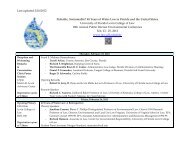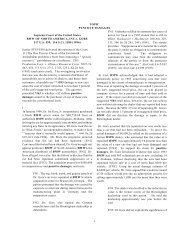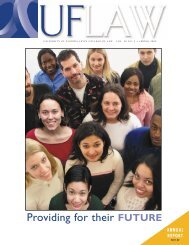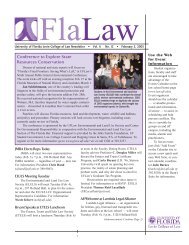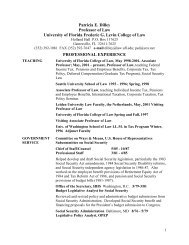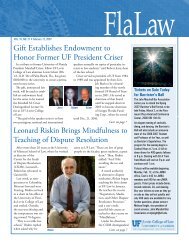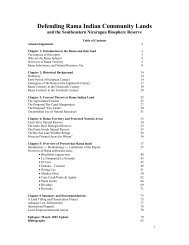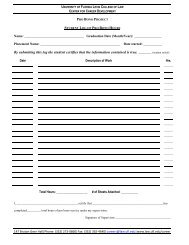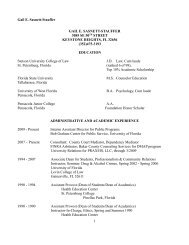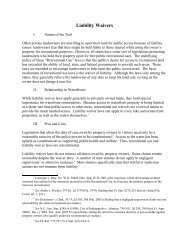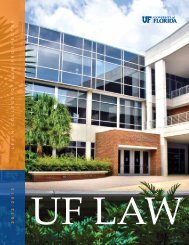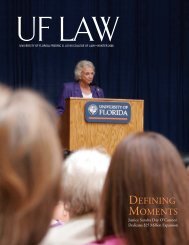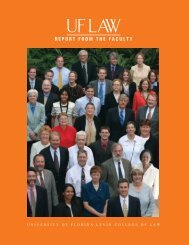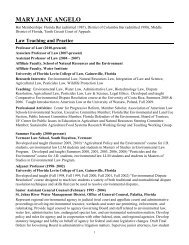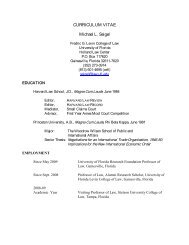Download Magazine - Levin College of Law - University of Florida
Download Magazine - Levin College of Law - University of Florida
Download Magazine - Levin College of Law - University of Florida
You also want an ePaper? Increase the reach of your titles
YUMPU automatically turns print PDFs into web optimized ePapers that Google loves.
A Pioneer in<br />
the Field<br />
Baseball player, Boynton Beach mayor, and<br />
Ted Williams’ attorney. What a life.<br />
B Y J A M E S H E L L E G A A R D<br />
When Gene Moore arrived in<br />
Boynton Beach in 1957, it was<br />
a small town <strong>of</strong> a few thousand<br />
residents on the southeast coast<br />
<strong>of</strong> <strong>Florida</strong>. He was 28 years old, a<br />
young lawyer just two years out <strong>of</strong><br />
law school, in a place where there<br />
werenʼt a whole lot <strong>of</strong> lawyers.<br />
“They had nothing down here,” says Moore, who<br />
would go on to serve as attorney and mayor for the city.<br />
When he arrived, there was no municipal water treatment<br />
or a municipal tennis court. There was, however, plenty<br />
<strong>of</strong> opportunity.<br />
“That was good because we could address those problems<br />
with the need being there,” says Moore (JD 53), now 78.<br />
“We just had to come up with the answers. We would run for<br />
<strong>of</strong>fice, get into city government and solve those problems.<br />
Because they were there. Down here everything was open<br />
for us to do it and take the responsibility and pride in doing<br />
it. You were a pioneer because the need was there.”<br />
In retrospect, he would not have done anything differently.<br />
His choice to start a real estate practice proved to be a good one<br />
as South <strong>Florida</strong> experienced unprecedented growth. Moore<br />
enjoyed having the type <strong>of</strong> practice over which he could have<br />
total control with little <strong>of</strong> his time spent in litigation or in the<br />
courtroom. Hard work led to more business, and his practice<br />
steadily broadened well beyond the city limits.<br />
“Itʼs a good network and a good, clean business to be<br />
in,” he says. “You deal with people. Over the years Iʼve dealt<br />
with a lot <strong>of</strong> people, and itʼs been very rewarding and very<br />
productive.”<br />
Born in Arkansas, Moore moved with his family at an<br />
early age to West Virginia, relocating to South <strong>Florida</strong> at<br />
age 11 in 1939 when his father, Gene Moore, Jr., took an<br />
advertising job with The Palm Beach Post, a newspaper<br />
young Gene “Buddy” Moore would spend much <strong>of</strong> his<br />
childhood delivering on his bicycle.<br />
When he graduated from Palm Beach High<br />
School, Moore won the newspaper boy scholarship.<br />
His baseball coach, the legendary Red Whittington<br />
who coached several future college and pro stars at<br />
Pam Beach High, directed Moore toward his alma mater, The<br />
Citadel in Charleston.<br />
“He talked me into going. I didnʼt know what the hell it<br />
was,” recalls Moore. “I didnʼt even know it was a military<br />
school until I got up there.”<br />
Moore arrived in 1946 and found himself competing for<br />
a spot on the sports teams with a lot <strong>of</strong> veterans who had<br />
recently returned from fighting in World War II. “I made the<br />
Moore at the Citidel in 1950.<br />
S U M M E R 2 0 0 7 11



